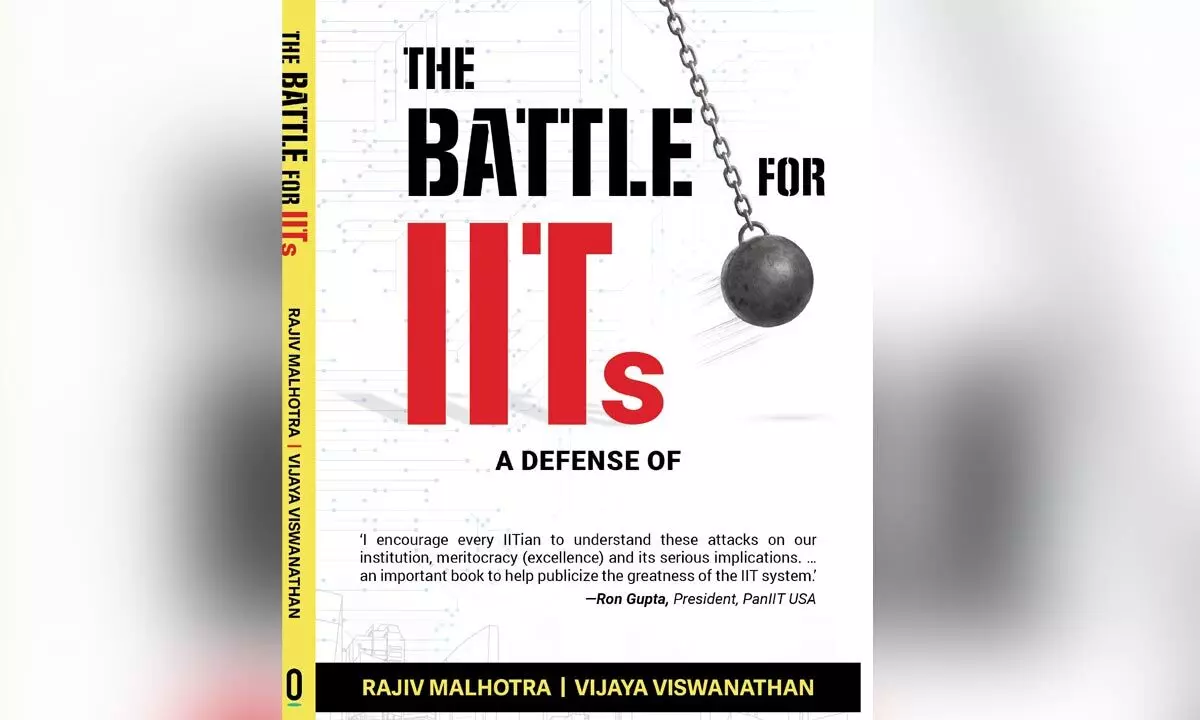The Battle for IITs

The Battle for IITs
‘The Battle for IITs,’ one of the latest books by Rajiv Malhotra and Vijaya Viswanathan, exposes the threats faced by the Indian Institutes of Technology (IITs) and other institutions of excellence in India from the West.
'The Battle for IITs,' one of the latest books by Rajiv Malhotra and Vijaya Viswanathan, exposes the threats faced by the Indian Institutes of Technology (IITs) and other institutions of excellence in India from the West. This book is part of a series that started with the flagship Snakes in the Ganga: Breaking India 2.0 in September 2022.
For long, the IITs have had the reputation of producing some of the best minds in the world. These institutes of excellence are now the target of the Breaking India forces. They want to undermine their credibility and dismantle them. The Battle for IITs explains in detail the attacks on IITs, the legal implications of such attacks, and the severe consequences on its students and faculty, India, and engineering education. The authors identify the American project led by Harvard's woke machinery as the perpetrator of these well-crafted attacks. Their goal is to dismantle India's premier educational institutes. The book is an evidence-based rebuttal to the attacks and acts as a toolkit for IITians and other engineers to tackle the false accusations of being casteist bigots.
The premise of Harvard professor Ajantha Subramanian's book The Caste of Merit is that the IITs and other institutions of excellence in India are oppressive structures designed to propagate the subjugation of Dalits and others marginalized communities by using 'merit' as a front for casteism.
The authors make a compelling case by examining the foundations for such baseless accusations that are rooted in Marxism and postmodernism. The authors explain the evolution from Marxism to Postmodernism to Critical Race Theory to Critical Caste Theory. The book also raises issues concerning professors like Ajantha Subramanian, who have institutional status and the privilege to disseminate 'critical theories' and social sciences constructed by closely knit knowledge cartels, completely shut for peer review. They have total control over knowledge production, and any critique from outside the elite cartel is sidelined. Harvard stands exposed for crafting several institutional mechanisms for sanctioning such theories that are factually inaccurate. The use of Harvard University's press to publish books like Subramanian's 'The Caste of Merit' is an example of such institutional mechanisms. It is evident that this woke machinery is out to dismantle meritocratic structures in India.
Subramanian also blames the success of "upper caste" Indian immigrant techies in Silicon Valley as a caste conspiracy while turning a blind eye to America's own immigration policies that are based on meritocracy. The book exposes how such theories will embolden the breaking India forces and fuel communal hatred and divisiveness in the already fragmented and broken Indian education system. It is also shown how media outlets such as The New York Times, The Washington Post, BBC, NPR, Bloomberg, and The Wire propagate such narratives. We also learn of the sinister role played by organizations such as the Equality Labs for targeting Indians, particularly Hindu Americans. Hindu Americans are accused of perpetrating caste discrimination, especially the "upper caste" Hindu Americans from the IITs. Equality Labs accused Cisco of over-representing the 'South Asian Indian' workforce and neglecting to protect the rights of Dalit employees, who are 'the darkest complexion of castes' from facing discrimination and harassment from colleagues enforcing a 'strict Hindu religious and social hierarchy.' The complaint stated that Cisco had failed to prevent 'inequalities associated with caste status, ritual purity, and social exclusion' from its workplace.
In conclusion, The Battle for IITs effectively refutes the claims that the IITs and other institutes of excellence in India are casteist in nature with numerous facts and pieces of evidence. It is an effective tool to combat the latest frontier of the breaking India forces.
(The writer is a researcher, author, YouTube/podcast host. She has an educational background in computer science and business
management)










